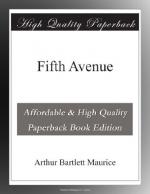There was, however, one portion of land belonging to the Avenue where he felt himself thoroughly at home. When, of a summer’s evening, darkness had fallen, and the leaves were fluttering in the warm breeze, and high overhead Diana’s light was twinkling, and the derelicts were gathered on the Park benches, the world was full of delightful mystery and magic. Close to the curb, at one corner of the Square, a low grey motor-car with engine silent. Then whimsical fancy and a haunting memory of Robert Louis Stevenson’s “New Arabian Nights” builded up the story “While the Auto Waits.” Or perhaps the sight of a car swiftly moving with its emergency tire dangerously loose, and to that fertile brain were flashed the ingredients of “The Fifth Wheel.” “There is an aristocracy of the public parks and even of the vagabonds who use them for their private apartments,” wrote Sidney Porter in “The Shocks of Doom.” Vallance of the story felt rather than knew this, but when he stepped down out of his world into chaos his feet brought him directly to Madison Square. Probably Sherard Plumer, the down-and-out artist, was another to recognize its quality even before he fell in with Carson Chalmers, as outlined in “A Madison Square Arabian Night”; and also Marcus Clayton of Roanoke County, Virginia, and Eva Bedford, of Bedford County of the same State; and the disreputable Soapy, of “The Cop and the Anthem,” when he sought a park bench on which to ponder over just what violation of the law would insure his deportation to Blackwell’s Island, which was his Palm Beach and Riviera for the winter months. Here, to O. Henry, was the common ground of all, the happy and the unfortunate, the just and the unjust, the Caliph and the cad; and far above, against the sky, was the dainty goddess who presided over the destinies of all, Miss Diana, who, according to the opinion expressed by Mrs. Liberty in “The Lady Higher Up,” has the best job for a statue in the whole town, with the Cat-Show, and the Horse-Show, and the military tournaments where the privates “look grand as generals, and the generals try to look grand as floorwalkers,” and the Sportsman’s Show, and above all, the French Ball, “where the original Cohens and the Robert Emmet-Sangerbund Society dance the Highland fling with one another.”
Other figures of fiction, in fancy, flit across the Square, or throng the near-by streets. In that dense, pushing, alien-tongued multitude that at the noon hour congests the sidewalks of the Avenue to the south of Twenty-third Street, one may catch a glimpse of Mr. Montague Glass’s Abe Potash and Morris Perlmutter, long since moved uptown from their original loft in Division Street in the stories, and in Leonard Street in fact. The crowd is thickest at the Twenty-first Street corner, where, in the novels of other days, the mature burghers used to watch the passing ladies from the windows of the Union Club. But there is little inclination to tarry long there. The environment of the Square is a pleasanter environment.




